

9780335222407.pdf. Mezirow's%20chapter,%20How%20Critical%20Refletion%20Triggers%20TL.pdf. International_Approaches_to_Seconday_Education_Final.pdf. Framework_en.pdf. JOTS v26n2 - Pedagogy vs. Andragogy: A False Dichotomy? Blog: The new digital learning age in three tribes, seven charts and three recommendations.
Technological change is a pervasive force in society.
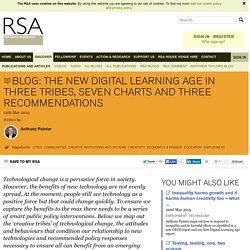
However, the benefits of new technology are not evenly spread. At the moment, people still see technology as a positive force but that could change quickly. To ensure we capture the benefits to the max there needs to be a series of smart public policy interventions. Below we map out the ‘creative tribes’ of technological change, the attitudes and behaviours that condition our relationship to new technologies and recommended policy responses necessary to ensure all can benefit from an emerging spontaneous shared learning economy. The three tribes - The ‘confident creators’ who are adept at using new technology to develop their knowledge, creativity and social capital. . - The ‘held back’ not only see the benefits of new technology but they are using it to learn.
. - Finally, there are the ‘safety firsters’. (There are two further groups - the 'comfortable' and 'connected' retired (or near-retired also in reality). Seven charts 1. 2. 3. Canadian Journal for the Study of Adult Education. Canadian Journal for the Study of Adult Education is a refereed scholarly journal committed to the dissemination of knowledge derived from disciplined inquiry in the field of adult and continuing education.
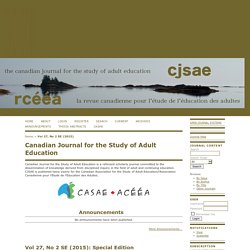
CJSAE is published twice yearly for the Canadian Association for the Study of Adult Education/l'Association Canadienne pour l'Étude de l'Éducation des Adultes. Announcements Vol 27, No 2 SE (2015): Special Edition Open Access. About. The Transformative Learning Centre is based at the Ontario Institute for Studies in Education of the University of Toronto.
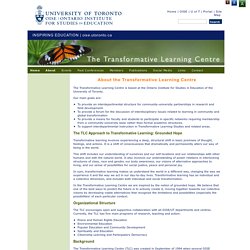
Our main goals are: To provide an interdepartmental structure for community-university partnerships in research and field development. To provide a forum for the discussion of interdisciplinary issues related to learning in community and global transformation To provide a means for faculty and students to participate in specific networks requiring membership from a community-university base rather than formal academic structures. To support interdepartmental instruction in Transformative Learning Studies and related areas.
The TLC Approach to Transformative Learning: Grounded Hope. Canadian Journal of Higher Education. 81-595-MIE2003009.pdf. AdultENG19juin11h36FINALv6.pdf. 43977_en. Rhizomatic Learning. Cognitivism. A New Pedagogy is Emerging... and Online Learning is a Key Contributing Factor. In all the discussion about learning management systems, open educational resources (OERs), massive open online courses (MOOCs), and the benefits and challenges of online learning, perhaps the most important issues concern how technology is changing the way we teach and - more importantly - the way students learn.
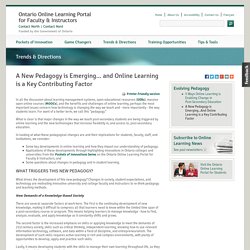
A New Pedagogy is Emerging... and Online Learning is a Key Contributing Factor. 2010-10-11WhatistheFutureofLearninginCanada.pdf. AdultImmigrantLearningNeedsFinalWORD. Adult Education. Adult Education in Canada is both a field of practice and (since the 1960s) a field of study.
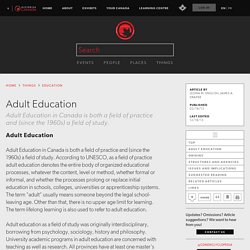
Adult Education Adult Education in Canada is both a field of practice and (since the 1960s) a field of study. According to UNESCO, as a field of practice adult education denotes the entire body of organized educational processes, whatever the content, level or method, whether formal or informal, and whether the processes prolong or replace initial education in schools, colleges, universities or apprenticeship systems. The term "adult" usually means someone beyond the legal school-leaving age. Other than that, there is no upper age limit for learning.
Adult education as a field of study was originally interdisciplinary, borrowing from psychology, sociology, history and philosophy. Origins Adults have always been engaged in learning, whether for survival, creativity, communal and individual interaction, or personal growth. From 1900 to 1925 programs for adults continued to expand. ADULT LEARNERS’ WEEK 2014 IN CANADA.
I’m still learning!
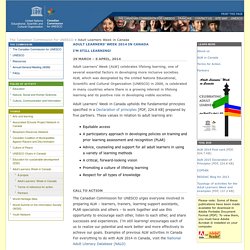
29 March – 6 April, 2014 Adult Learners’ Week (ALW) celebrates lifelong learning, one of several essential factors in developing more inclusive societies. ALW, which was designated by the United Nations Educational, Scientific and Cultural Organization (UNESCO) in 2000, is celebrated in many countries where there is a growing interest in lifelong learning and its positive role in developing viable societies. Adult Learners’ Week in Canada upholds the fundamental principles specified in a Declaration of principles [PDF, 224.8 KB] prepared by five partners. Adult-Learning-Trends-in-Canada-2013.pdf. Home. Adult learning in Canada: Characteristics of learners.
View the most recent version.
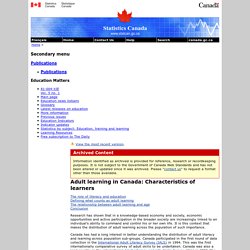
Archived Content Information identified as archived is provided for reference, research or recordkeeping purposes. It is not subject to the Government of Canada Web Standards and has not been altered or updated since it was archived. Please "contact us" to request a format other than those available. Grale_en.pdf. Learning Theories. Educational Leadership:The Constructivist Classroom:The Courage to Be Constructivist. Constructivism as a Paradigm for Teaching and Learning. What is constructivism?

How does this theory differ from traditional ideas about teaching and learning? What does constructivism have to do with my classroom? Expert interview What is the history of constructivism, and how has it changed over time? What are some critical perspectives? A journey into Constructivism. Trivial constructivismRadical constructivismSocial constructivismCultural constructivismCritical constructivismConstructionism Introduction During the past three months, I’ve been learning about constructivism by reading scholarly texts, discussing them with my class and my friends, journal keeping and personal reflection.
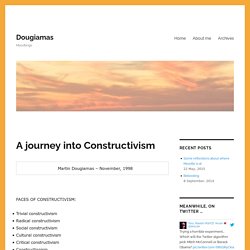
Through this interesting time, I feel my understanding has grown considerably and have already proved useful. I’ve constructed this text in an attempt to demonstrate my current understandings of constructivism, as well as the process by which my knowledge developed. I had some trouble with the self-referential nature of the material.
Constructivism.pdf. Assimilation and Accommodation. Assimilation and Accommodation are the two complementary processes of Adaptation described by Piaget, through which awareness of the outside world is internalised.
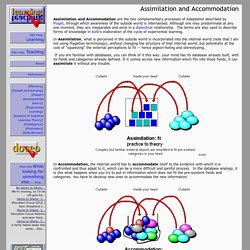
Although one may predominate at any one moment, they are inseparable and exist in a dialectical relationship. The terms are also used to describe forms of knowledge in Kolb’s elaboration of the cycle of experiential learning. Educational Leadership:The Constructivist Classroom:The Courage to Be Constructivist. Constructivism as a Paradigm for Teaching and Learning. Philosophy of Learning. Definition Constructivism is a philosophy of learning founded on the premise that, by reflecting on our experiences, we construct our own understanding of the world we live in. Each of us generates our own “rules” and “mental models,” which we use to make sense of our experiences. Learning, therefore, is simply the process of adjusting our mental models to accommodate new experiences. Discussion.